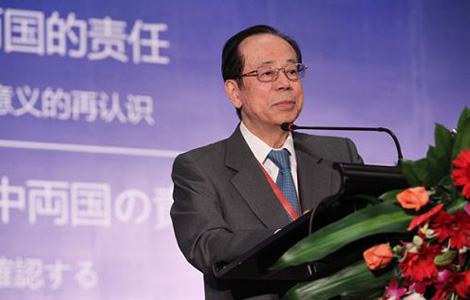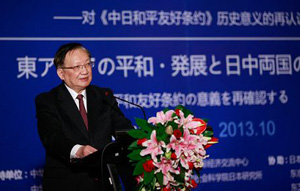US-China CEO's Dialogue held in Washington
Updated: 2013-10-28 15:39
(chinadaily.com.cn)
|
||||||||
Participants agreed that reaching a comprehensive trade and investment agreement would be a long process, but underscored that both countries could benefit from interim agreements that would form the building blocks for an eventual US-China Trade and Investment Agreement.
Participants agreed that interim agreements should be explored in areas of common interest and where consensus can be most readily achieved.
Participants agreed that both sides have established a solid foundation through nine rounds of negotiations on a BIT. Participants agreed that the two governments should prioritize advancing BIT negotiations and called on them to make maximum efforts, building on the progress and commitments at the July 2013 US-China Strategic & Economic Dialogue (S&ED), to complete negotiations on a high-standard agreement on an accelerated basis. Participants agreed that reaching an agreement on a high-standard BIT would be an entry point for US-China Trade and Investment Agreement negotiations.
Participants also identified government procurement as another area of potential common interest that could serve as a building block for a US-China Trade and Investment Agreement as each country seeks increased ability to participate in large infrastructure projects of the other—including at the subfederal level via the states of the United States and the provinces and cities of China. Participants commended the research work under the Dialogue platform on two-way investment in the US and Chinese infrastructure markets and called for additional discussion and examination of the opportunities and challenges in two-way investment at the sixth meeting of the Dialogue in China next year.
More broadly, participants agreed that for a US-China Trade and Investment Agreement to be economically meaningful and politically viable, it would ultimately need to include strong disciplines that are enforced in a manner that liberalizes and facilitates trade and investment, and reduces market-distorting and discriminatory regulations in important areas, including investment, merchandise tariffs, agricultural trade, services, technical barriers to trade, intellectual property rights, and dispute settlement. US participants noted that additional priorities should include robust disciplines in the areas of competition policy and state-owned enterprises, government procurement, and other areas. Chinese participants noted that additional priorities should include liberalization of US export controls on high technology products, market economy status for China, increased transparency of US national security reviews of Chinese foreign direct investment transactions, and other areas.
In particular, participants emphasized that liberalization of services trade offers a unique opportunity for deepening economic ties between China and the United States. Participants noted that services liberalization would benefit both countries, as China seeks to greatly increase the role of services in its economy in the context of a new development and restructuring strategy and the United States seeks the opportunity to expand its participation in a wide array of services activities in China.
Participants acknowledged that the launch of China Shanghai Pilot Free Trade Zone is an important economic development for China and a signal of its desire to pursue market-based economic reforms. They further agreed that if China continues to open further and implement in the Zone additional meaningful and deep reforms that are extended nationally, the Zone could serve as a platform to significantly increase opportunities for bilateral trade and investment and ultimately a US-China Trade and Investment Agreement.
Beyond the areas of trade and investment, participants agreed that both countries have shared interests and responsibilities in ensuring energy security and tackling common challenges. Participants expressed their support for enhanced cooperation, dialogues and information exchange on energy issues of shared concern.

 Sao Paulo Fashion Week held in Brazil
Sao Paulo Fashion Week held in Brazil
 Serena beats Li Na for WTA title
Serena beats Li Na for WTA title
 Nuclear submarine fleet comes of age
Nuclear submarine fleet comes of age
 5 pharmacies begin to sell baby formula
5 pharmacies begin to sell baby formula
 The suave style of America's dapper dynasty has arrived
The suave style of America's dapper dynasty has arrived Mother and four children stabbed to death in New York
Mother and four children stabbed to death in New York
 China Fashion Week S/S 2014: day 2
China Fashion Week S/S 2014: day 2
 Demonstrators protest against govt surveillance in US
Demonstrators protest against govt surveillance in US
Most Viewed
Editor's Picks

|

|

|

|

|

|
Today's Top News
3 die after car crash at Tian'anmen Square
ABC apologizes for offensive words on Chinese
NQ Mobile hits back after US stock plunge
Jewelry exhibit dazzles Southern California
Obama aware of spying on Merkel: German paper
High speed versus history
States gear up for symposium
Cousin killed mom, 4 kids
US Weekly

|

|






